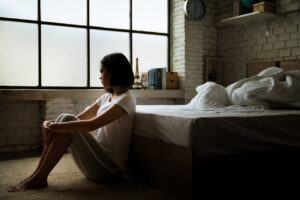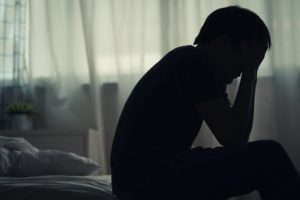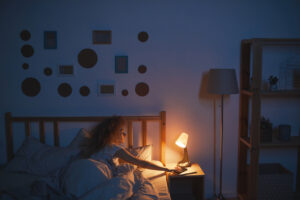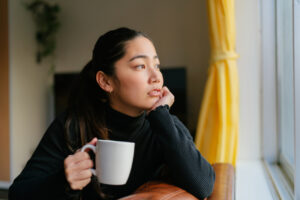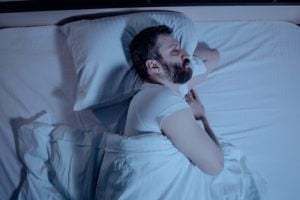Anxiety and Sleep
- Anxiety can disrupt sleep, creating a sleep debt that worsens anxiety symptoms.
- Different types of anxiety disorders impact people and their sleep differently.
- Anxiety can keep people from falling asleep, creating a loop of insomnia, stress, and worry.
- Practicing good sleep hygiene and seeking professional help is essential to managing anxiety-related sleep issues.
Anxiety is frequently connected to sleeping problems. Excess worry and fear make it harder to fall asleep and stay asleep through the night. Sleep deprivation can worsen anxiety, spurring a negative cycle involving insomnia and anxiety disorders.
Anxiety disorders are the most common mental health problem in the United States, and insufficient sleep is known to have sweeping negative implications for overall health. As a result, understanding and addressing the links between anxiety and sleep can be fundamental to physical and emotional wellness.
What Is Anxiety?
Anxiety is a feeling of worry and unease. It’s normal to experience anxiety occasionally in response to fearful or stressful situations.
In anxiety disorders , this distress becomes excessive. Fears are not proportional to the situation, and worrying interferes with everyday life. These feelings become persistent, occurring most days for a period of six months or more.
What Does Anxiety Feel Like?
The symptoms of anxiety disorders can affect people both emotionally and physically. People with anxiety may feel:
- Extremely nervous and on-edge
- Poor concentration
- Irritability and restlessness
- Fear or sense of impending doom
- Tense muscles
- Rapid breathing and heartbeat
- Sweating
- Trembling
- Gastrointestinal distress
- Fatigue
Many people with anxiety disorders attempt to avoid situations that could trigger heightened worry; however, this does not resolve their underlying fear and can interrupt both professional and personal activities. Over time, a person with anxiety disorder may get used to being worried such that a state of distress or fear seems normal.
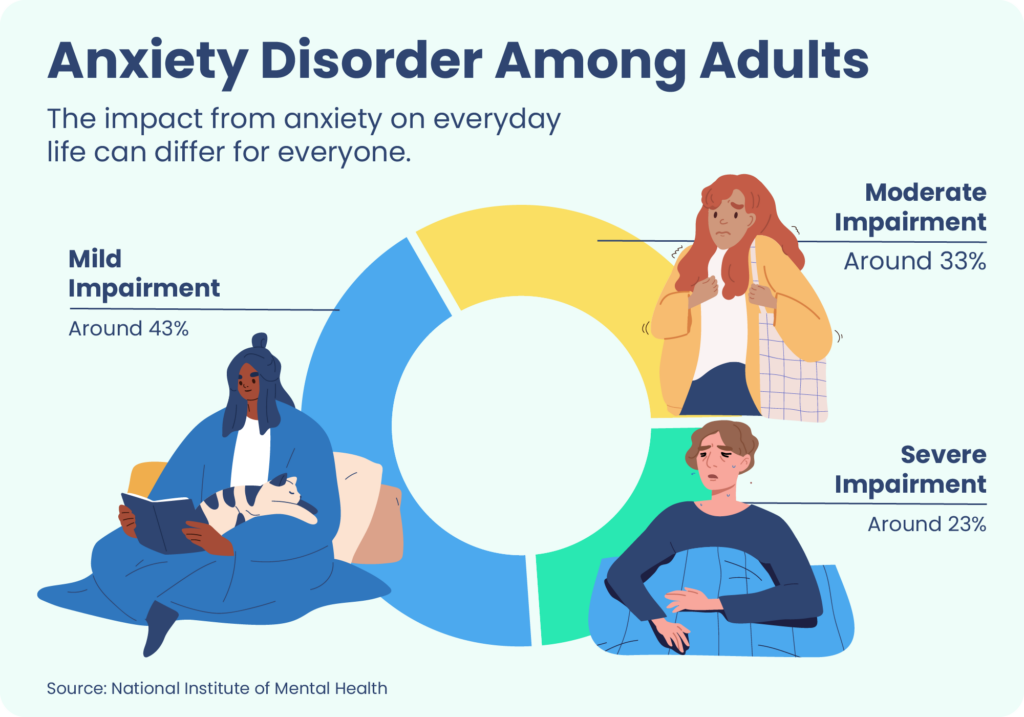
Not all people with anxiety disorders have the same degree of symptoms or impact from anxiety on their everyday life. In one large survey, around 43% of adults described having mild impairment of their life from anxiety. Around 33% said it was moderate, and nearly 23% said it was severe.
What Are the Types of Anxiety Disorders?
Anxiety is a core element of a number of specific disorders, although not all are categorized strictly as anxiety disorders.
- Generalized Anxiety Disorder (GAD): People with GAD have significant, looming worries about many different things that can cause an overarching sense of anxiety.
- Panic Disorder: Extremely intense episodes of fear, known as panic attacks, that usually last for a few minutes at a time are the defining feature of Panic Disorder.
- Social Anxiety Disorder: This disorder involves an extreme fear of social settings and potential embarrassment in front of other people.
- Specific Phobias: Specific phobias are intense fears caused by particular triggers. Some of the most common specific phobias include agoraphobia (a fear of open or enclosed spaces, being in a crowd, or being outside or home alone) and separation anxiety.
- Obsessive-Compulsive Disorder (OCD): In OCD, a person obsesses about an issue in a negative way such that it provokes anxiety, and this causes a compulsion, which is their attempt to control or eliminate that anxiety. Compulsions are repeated ritually and can directly impact everyday activities.
- Post-traumatic Stress Disorder (PTSD): This condition can arise after a person is exposed to a painful or disturbing situation. People with PTSD may relive the stressful event, feel on-edge, and have potentially debilitating anxiety.
| Adults Affected in U.S. | Percentage of U.S. Adult Population | |
|---|---|---|
| Generalized Anxiety Disorder | 6.8 million | 3.1% |
| Panic Disorder | 6 million | 2.7% |
| Social Anxiety Disorder | 15 million | 7.1% |
| Specific Phobias | 19.3 million | 9.1% |
| Obsessive-Compulsive Disorder | 2.5 million | 1.2% |
| Post-traumatic Stress Disorder | 7.7 million | 3.6% |
What Causes Anxiety Disorders?
Anxiety disorders are the most common type of mental illness, affecting around 20% of American adults . However, the exact cause of anxiety is unknown. In fact, researchers believe that there is not one single cause but rather an interplay of factors that include a person’s genetics, family history, and exposure to negative life events. Some health problems and drugs can also contribute to symptoms of anxiety.
Anxiety disorders can occur alongside other mental health problems like depression. According to the Anxiety and Depression Association of America (ADAA) , nearly 50% of people with depression are also diagnosed with an anxiety disorder.
What Is the Relationship Between Anxiety and Sleep?
Serious sleep disturbances, including insomnia, have long been recognized as a common symptom of anxiety disorders. People who are plagued with worry often ruminate about their concerns in bed, and this anxiety at night can keep them from falling asleep.
In fact, a state of mental hyperarousal, frequently marked by worry, has been identified as a key factor behind insomnia. People with anxiety disorders are inclined to have higher sleep reactivity, which means they are much more likely to have sleeping problems when facing stress.
Sleeping difficulties have been found for people with various types of anxiety including generalized anxiety disorder, OCD, and PTSD. In several studies, over 90% of people with PTSD associated with military combat have reported symptoms of insomnia.
Distress about falling asleep can create a sleep anxiety that reinforces a person’s sense of dread. These negative thoughts about going to bed, a type of anticipatory anxiety, can create challenges to healthy sleep schedules and routines. Research indicates that anxiety and pre-sleep rumination may affect vivid dreaming during rapid eye movement (REM) sleep. Anxiety can provoke nightmares and disturbing dreams that create a higher likelihood of sleep disruptions and may reinforce fear around going to sleep.
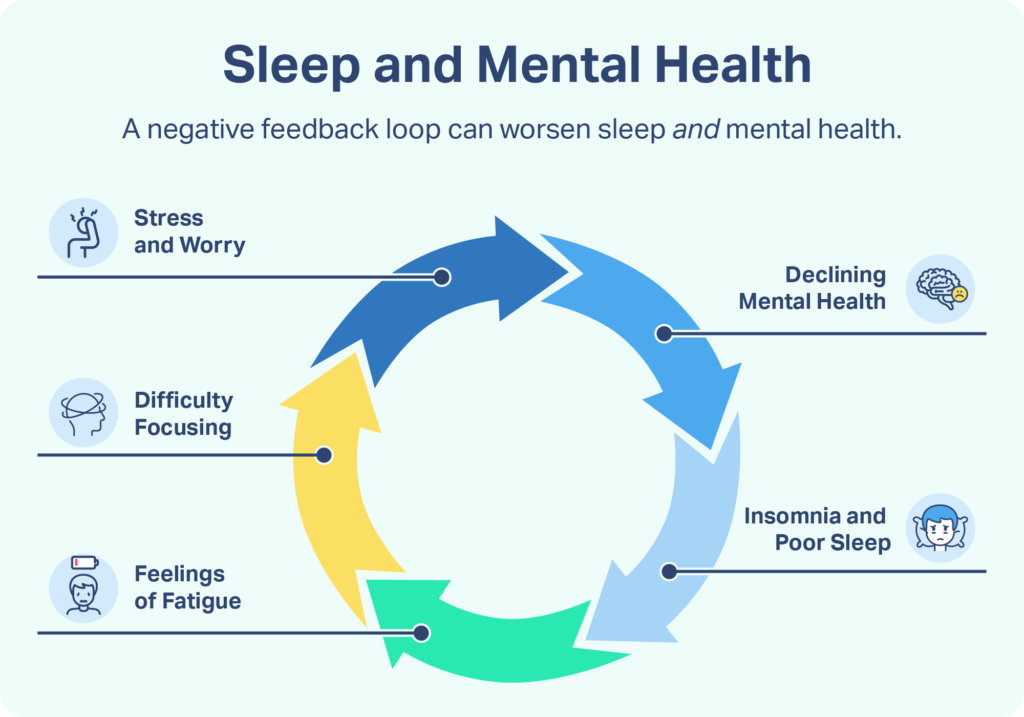
At the same time, strong evidence indicates that sleep deprivation can instigate or worsen anxiety disorders. Researchers have found that people who are prone to anxiety are especially sensitive to the effects of insufficient sleep on mood and emotional health. The bidirectional relationship means that anxiety and sleep deprivation can be self-reinforcing; worrying causes poor sleep, while further sleep difficulties cause greater anxiety.
People with obstructive sleep apnea (OSA), a sleep disorder that causes repeated lapses in breathing and interrupted sleep, have been found to have higher rates of mental health problems, including depression, anxiety, and panic disorder.
How to Fall Asleep with Anxiety
Although the impacts of anxiety disorders can be substantial, they are one of the most treatable mental health disorders. Any person who has persistent or significant anxiety and/or sleeping problems should talk with a doctor who can best assess their situation and discuss the benefits and downsides of the potential treatment options in their case.
Cognitive behavioral therapy (CBT) is a common treatment for anxiety disorders. It is a type of talk therapy that works to reorient negative thinking, and it has had success in decreasing anxiety. Studies have found that CBT can often reduce anxiety even in people who have insomnia . Addressing anxiety can pave the way for better sleep, but severe cases of insomnia may persist after CBT for anxiety. CBT for insomnia (CBT-I) may be a useful next step in these cases.
Several different types of medications are approved to treat anxiety disorders including anti-anxiety drugs, antidepressants, and beta-blockers. These medications are intended to mitigate symptoms rather than cure the underlying anxiety.
Because of the multifaceted relationship between anxiety and sleep, getting better rest may help combat feelings of anxiety. Building healthy sleep habits and a consistent routine can make going to bed a more pleasant experience. Steps including making your bed more comfortable, eliminating sources of sleep disruption like light and noise, and avoiding caffeine and alcohol in the evening can help enhance your sleep.
Trying relaxation techniques can help identify ways to get rid of anxiety and make it easier to fall asleep quickly and peacefully. Relaxation exercises may be a component of CBT and can break the cycle of worry and rumination. You may also want to try scheduling times to actively worry, as this may eliminate worrying time as you lay down for sleep. Deep breathing, mindfulness meditation, and guided imagery are just a few approaches to relaxation that can help put your mind at-ease before bed or if you wake up during the night.
References
6 Sources
-
National Institute of Mental Health (NIMH). (2018, July). Anxiety Disorders.
https://www.nimh.nih.gov/health/topics/anxiety-disorders/index.shtml -
National Institute of Mental Health (NIMH). (2017, November). Statistics: Any Anxiety Disorder.
https://www.nimh.nih.gov/health/statistics/any-anxiety-disorder.shtml -
National Institutes of Health (NIH). (2016, March). NIH News in Health: Understanding Anxiety Disorders.
https://newsinhealth.nih.gov/2016/03/understanding-anxiety-disorders -
Anxiety and Depression Association of America (ADAA). (n.d.). Facts & Statistics.
https://adaa.org/about-adaa/press-room/facts-statistics -
Gehrman, P. (2020, March 26). Sleep Problems in Veterans with PTSD.
https://www.ptsd.va.gov/professional/treat/cooccurring/sleep_problems_vets.asp -
Kaczkurkin, A. N., Tyler, J., Turk-Karan, E., Belli, G., & Asnaani, A. (2020). The Association between Insomnia and Anxiety Symptoms in a Naturalistic Anxiety Treatment Setting. Behavioral sleep medicine, 1–16. Advance online publication.
https://pubmed.ncbi.nlm.nih.gov/31955594/


